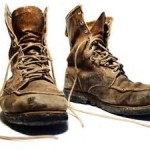English Plurals
 I found the following poem on the oddities of English plurals in our local newspaper today. According to the columnist, the poem’s origin is obscure: it showed up in newspapers in the late 19th century and more recently in “Crazy English,” by Richard Lederer. It’s just the sort of thing that my father and those other “hard hat poets” on Wake Island would have loved. So here, apropos of nothing, is “Ode to English Plurals.”
I found the following poem on the oddities of English plurals in our local newspaper today. According to the columnist, the poem’s origin is obscure: it showed up in newspapers in the late 19th century and more recently in “Crazy English,” by Richard Lederer. It’s just the sort of thing that my father and those other “hard hat poets” on Wake Island would have loved. So here, apropos of nothing, is “Ode to English Plurals.”
We’ll begin with a box, and the plural is boxes, but the plural of ox should be oxen, not oxes.
Then one fowl is a goose, but two are called geese, yet the plural of moose should never be meese.
You may find a lone mouse or a whole nest of mice, but the plural of house is houses, not hice.
If the plural of man is always called men, why shouldn’t the plural of pan be called pen?
The cow in the plural may be cows or kine, but a bow if repeated is never called bine, and the plural of vow is vows, never vine.
If I speak of a foot and you show me your feet, and I give you a boot, would a pair be called beet?
If one is a tooth, and a whole set are teeth, why shouldn’t the plural of booth be called beeth?
If the singular’s this and the plural is these, should the plural of kiss ever be nicknamed keese?
Then one may be that and three would be those, yet hat in the plural would never be hose, and the plural of cat is cats, not cose.
We speak of a brother, and also of brethren, but though we say mother, we never say methren.
Then the masculine pronouns are he, his and him, but imagine the feminine she, shis and shim.
So the English, I think, you all will agree, is the queerest language you ever did see.

